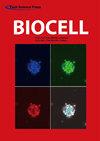HOXB8 contributed to oxaliplatin chemo-resistance in colon cancer cells by activating STAT3
IF 1
4区 生物学
Q4 BIOLOGY
引用次数: 0
Abstract
Background: Homeobox B8 (HOXB8), a member of HOX family, plays a key role in the development of colorectal cancer (CRC). However, the function of HOXB8 in oxaliplatin (OXA) resistance in CRC is still unclear. This study investigated the role and precise molecular mechanism of HOXB8 in OXA-resistant CRC cells. Methods: The cell viability was measured by the 3-[4,5-dimethylthiazol-2-yl]-2,5 diphenyl tetrazolium bromide (MTT) assay, and the colony forming ability was determined by colony formation assay. The silencing RNA (siRNA) approach was used to knockdown HOXB8 in CRC cells while the lentiviral transfection system was used to establish stable HOXB8 overexpressing CRC cells. The protein and mRNA levels were evaluated by western blot and real-time reverse transcription-polymerase chain reaction. Results: HOXB8 expression was upregulated in OXA-resistant HCT116 cells (HCT116/OXA) compared to its level in the parent HCT116 cells. Knockdown of HOXB8 significantly inhibited CRC cell growth by suppressing the signal transducer and activator of transcription 3 (STAT3) pathway. HOXB8 knockdown also potentiated cytotoxicity of OXA in CRC cells. Inversely, HOXB8 overexpression attenuated OXA-induced growth inhibition of HCT116 cells and RKO cells by activating STAT3 signaling. HOXB8 knockdown effectively inhibited HCT116/OXA cell viability regardless of OXA treatment by suppressing STAT3 signaling. Conclusions: These results shed light on the important functions of HOXB8 in OXA-resistant CRC and suggested that targeting HOXB8 might be an effective therapeutic strategy for select OXA-resistant CRC patients.HOXB8通过激活STAT3参与结肠癌细胞对奥沙利铂的耐药
背景:Homeobox B8 (HOXB8)是HOX家族成员之一,在结直肠癌(CRC)的发生发展中起着关键作用。然而,HOXB8在大肠癌奥沙利铂(OXA)耐药中的作用尚不清楚。本研究探讨了HOXB8在oxa耐药CRC细胞中的作用及其精确的分子机制。方法:采用3-[4,5-二甲基噻唑-2-基]-2,5二苯基溴化四唑(MTT)法测定细胞活力,采用集落形成法测定细胞集落形成能力。采用沉默RNA (siRNA)方法敲低CRC细胞中的HOXB8,采用慢病毒转染系统建立稳定的过表达HOXB8的CRC细胞。western blot和实时逆转录-聚合酶链反应检测蛋白和mRNA水平。结果:与亲本HCT116细胞相比,HOXB8在OXA抗性HCT116细胞(HCT116/OXA)中的表达上调。敲低HOXB8可通过抑制STAT3 (signal transducer and activator of transcription 3)通路显著抑制CRC细胞生长。HOXB8敲低也增强了OXA在结直肠癌细胞中的细胞毒性。相反,HOXB8过表达通过激活STAT3信号通路减弱oxa诱导的HCT116细胞和RKO细胞的生长抑制。HOXB8敲低通过抑制STAT3信号传导有效抑制HCT116/OXA细胞活力,无论OXA是否治疗。结论:这些结果揭示了HOXB8在oxa耐药结直肠癌中的重要功能,并提示靶向HOXB8可能是治疗部分oxa耐药结直肠癌患者的有效策略。
本文章由计算机程序翻译,如有差异,请以英文原文为准。
求助全文
约1分钟内获得全文
求助全文
来源期刊

Biocell
生物-生物学
CiteScore
1.50
自引率
16.70%
发文量
259
审稿时长
>12 weeks
期刊介绍:
BIOCELL welcomes Research articles and Review papers on structure, function and macromolecular organization of cells and cell components, focusing on cellular dynamics, motility and differentiation, particularly if related to cellular biochemistry, molecular biology, immunology, neurobiology, and on the suborganismal and organismal aspects of Vertebrate Reproduction and Development, Invertebrate Biology and Plant Biology.
 求助内容:
求助内容: 应助结果提醒方式:
应助结果提醒方式:


